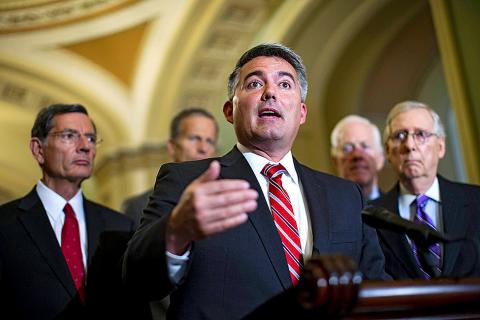Taiwan yesterday thanked US senators for introducing legislation that aims to help Taipei keep its 17 remaining allies, after China within three years poached five of the nation’s diplomatic allies.
The bipartisan Taiwan Allies International Protection and Enhancement Initiative (TAIPEI) Act introduced on Monday by Republican senators Cory Gardner and Marco Rubio, and Democratic senators Ed Markey and Bob Menendez is intended to strengthen Taiwan’s standing in the world, a news release issued by Gardner said.
It was created in response to five nations’ severance of diplomatic ties with Taiwan over the past two-and-a-half years due to Chinese pressure, it added.

Photo: AFP
“The TAIPEI Act requires a US strategy to engage with governments around the world to support Taiwan’s diplomatic recognition or strengthen unofficial ties with Taiwan,” the statement said.
It authorizes the US Department of State to downgrade US relations with any government that takes adverse action regarding Taiwan, including suspending or altering foreign assistance, such as military financing, it said.
“This bipartisan legislation demands a whole-of-government approach to stand up to China’s bullying tactics against Taiwan, and will send a strong message to those nations considering siding with China over Taiwan that there will be consequences for such actions,” Gardner was quoted as saying in the news release.
“Beijing is promising paydays to governments to entice them to cut diplomatic relations with Taiwan,” Markey said. “Without a coherent US strategy to push back, Taiwan’s official partners might drop from 17 to zero. We must stand up for our friends in Taiwan.”
Ministry of Foreign Affairs spokesman Andrew Lee (李憲章) expressed gratitude for the senators’ long-term support.
Washington is the nation’s most important ally, Presidential Office spokesman Sidney Lin (林鶴明) said, thanking the US Congress for its long-standing support.
“We will also engage in close negotiations with different divisions of the US government to ensure that Taiwan’s international space will not be affected by other factors” Lin said.
Since President Tsai Ing-wen (蔡英文) took office in May 2016, El Salvador, Sao Tome and Principe, Panama, the Dominican Republic and Burkina Faso have switched diplomatic recognition to Beijing.
A US Department of State spokesperson last month said that the decision by El Salvador, the last nation to cut ties, was disappointing.
“Although we recognize the sovereign right of every country to determine its diplomatic relations, we are deeply disappointed by this decision,” the spokesperson said.
Additional reporting by Su Yung-yao

CHAOS: Iranians took to the streets playing celebratory music after reports of Khamenei’s death on Saturday, while mourners also gathered in Tehran yesterday Iranian Supreme Leader Ayatollah Ali Khamenei was killed in a major attack on Iran launched by Israel and the US, throwing the future of the Islamic republic into doubt and raising the risk of regional instability. Iranian state television and the state-run IRNA news agency announced the 86-year-old’s death early yesterday. US President Donald Trump said it gave Iranians their “greatest chance” to “take back” their country. The announcements came after a joint US and Israeli aerial bombardment that targeted Iranian military and governmental sites. Trump said the “heavy and pinpoint bombing” would continue through the week or as long

TRUST: The KMT said it respected the US’ timing and considerations, and hoped it would continue to honor its commitments to helping Taiwan bolster its defenses and deterrence US President Donald Trump is delaying a multibillion-dollar arms sale to Taiwan to ensure his visit to Beijing is successful, a New York Times report said. The weapons sales package has stalled in the US Department of State, the report said, citing US officials it did not identify. The White House has told agencies not to push forward ahead of Trump’s meeting with Chinese President Xi Jinping (習近平), it said. The two last month held a phone call to discuss trade and geopolitical flashpoints ahead of the summit. Xi raised the Taiwan issue and urged the US to handle arms sales to

State-run CPC Corp, Taiwan (CPC, 台灣中油) yesterday said that it had confirmed on Saturday night with its liquefied natural gas (LNG) and crude oil suppliers that shipments are proceeding as scheduled and that domestic supplies remain unaffected. The CPC yesterday announced the gasoline and diesel prices will rise by NT$0.2 and NT$0.4 per liter, respectively, starting Monday, citing Middle East tensions and blizzards in the eastern United States. CPC also iterated it has been reducing the proportion of crude oil imports from the Middle East and diversifying its supply sources in the past few years in response to geopolitical risks, expanding

Pro-democracy media tycoon Jimmy Lai’s (黎智英) fraud conviction and prison sentence were yesterday overturned by a Hong Kong court, in a surprise legal decision that comes soon after Lai was jailed for 20 years on a separate national security charge. Judges Jeremy Poon (潘兆初), Anthea Pang (彭寶琴) and Derek Pang (彭偉昌) said in the judgement that they allowed the appeal from Lai, and another defendant in the case, to proceed, as a lower court judge had “erred.” “The Court of Appeal gave them leave to appeal against their conviction, allowed their appeals, quashed the convictions and set aside the sentences,” the judges